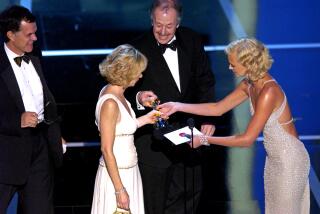Foreign films ‘Wadjda’ and ‘Broken Circle’ come with back stories
The foreign-language film field for the 2014 Academy Awards is an uncommonly strong one, incorporating the luscious fever dream “The Grand Beauty” (Italy), the heartbreaking family drama “Ilo Ilo” (Philippines) and “Gris Gris” (Chad), the story of a man pulled into the world of gas smuggling, among so many others. But it’s often the story behind the film that matters as much as the film itself.
Haifaa Mansour’s “Wadjda,” for instance, is not only Saudi Arabia’s first submission to the Oscars but the first feature ever shot in the country, whose ultraconservative government views cinema as a corrupt art form. Special arrangements had to be made to satisfy the academy requirement that the film be commercially exhibited in its native land — two foreign embassies and a cultural center served as makeshift theaters.
It’s common for films set in Saudi Arabia to shoot elsewhere, but for Mansour, filming in the country’s streets was essential, even though it meant she had to direct exterior scenes by walkie-talkie from inside a van.
FOR THE RECORD:
Foreign films: In the Dec. 12 Envelope section, an article about foreign films said the movie “Ilo Ilo” was the Philippines entry for the Academy Awards. “Ilo Ilo” is the Singaporean Oscar submission.
“If I had taken the easy way out and filmed somewhere else, it would not have been as satisfying,” she said from her home in Bahrain, where she lives with her husband, an American diplomat, and their two children. “I feel that it’s important to push boundaries. It’s not politics. It’s more like taking a stand.”
Mansour draws a distinction between being aggressive, which she says tends to rub Saudis the wrong way, and being quietly, persistently assertive. “In the Arab world, a lot of people go and they protest, and then they go home and forget,” she said. “That is not how change happens. It’s not about being angry. It’s about being focused. In a country with restrictions like Saudi Arabia, you have to go around things so you can survive and move ahead. It is very quiet and personal, and that is what we need: to have a dream and follow it.”
Not surprisingly, that’s the path followed by the film’s protagonist, a young Saudi girl (Waad Mohammed) called Wadjda who sets her heart on buying a new bicycle. In addition to transgressing the nation’s social customs — she explicitly wants the bike so she can out-race a boy — Wadjda’s choice of conveyance ties the film to Vittorio De Sica’s neorealistic landmark “Bicycle Thieves.” Although Wadjda’s desire is not linked to her family’s well-being, it’s nonetheless crucial as a signifier of her individuality in a world that systematically strips that away. Wadjda’s tattered canvas sneakers come under the disapproving eye of her schoolteachers, who caution students against raising their voices too loud lest passing men hear them drift over the school’s high walls. “Your voice is your nakedness,” they tell her.
TIMELINE: The Academy Awards through the years
The protagonists of the Belgian submission “The Broken Circle Breakdown” strip themselves bare in more ways than one, physically as energetic young lovers and emotionally as the parents of a 6-year-old girl with leukemia. Their voices bring them together but also risk ripping them apart. Didier (Johan Heldenbergh) and Elise (Veerle Baetens) fall in love as she watches him sing on stage; later she joins the band, sometimes harmonizing and often taking lead. But as their daughter’s condition worsens, their voices are more often raised in anger than in song and a fateful onstage tirade threatens to separate them for good.
Director Felix Van Groeningen developed “Broken Circle” from a theater production starring and co-written by Heldenbergh that took the form of a bluegrass concert with dramatic interludes. The pairing of Belgian drama with bluegrass music is hardly an obvious fit, but Heldenbergh felt passionately enough about it to learn to play banjo for the part — perhaps because, like his ex-punk character, he liked the snarling sound of it. The movie’s band has now become a real one, playing to sold-out houses in Belgium, where Baetens is a major star, and enlivening post-screening Q&As with impromptu tunes — a strategy that certainly didn’t hurt 2006’s “Once.”
Turning the play into a movie involved major restructuring, juggling multiple time frames and incorporating songs into the mix without stopping the film dead each time the band plays. “We couldn’t just stop the narrative, so we had to find ways the songs would help it,” Van Groeningen says. When Elise, a tattoo artist who, to Didier’s horror, has never heard of bluegrass pioneer Bill Monroe, sings Loretta Lynn’s “Country in My Genes,” it shows how thoroughly she’s become integrated into his world, but it also tragically foreshadows the genetic illness that will make their lives hell. Didier, a staunch atheist whose lack of faith grows more agonizing with each misfortune, sings “Will the Circle Be Unbroken,” but the question of whether or not there’s “a better home a-waiting in the sky” is one he only seriously broaches late in the game.
More to Read
Only good movies
Get the Indie Focus newsletter, Mark Olsen's weekly guide to the world of cinema.
You may occasionally receive promotional content from the Los Angeles Times.






